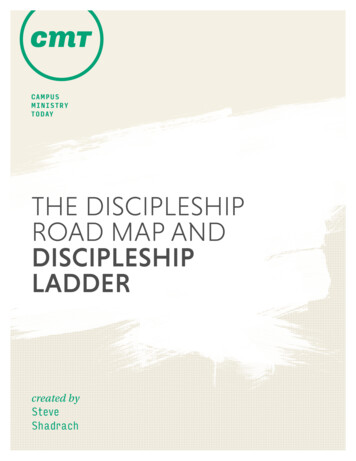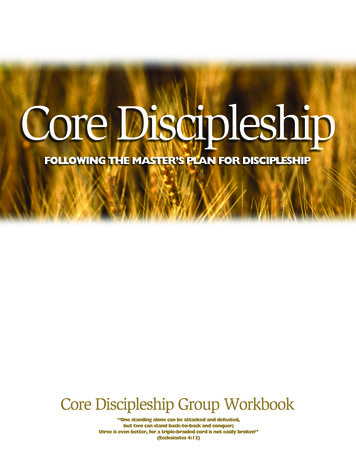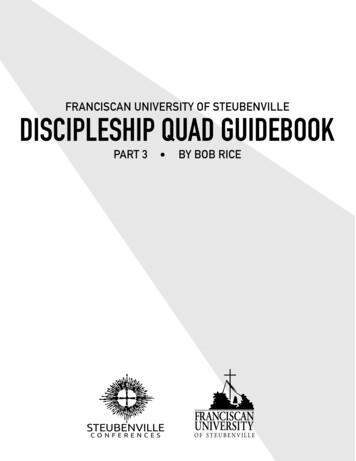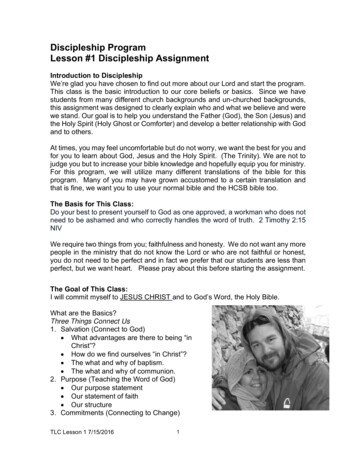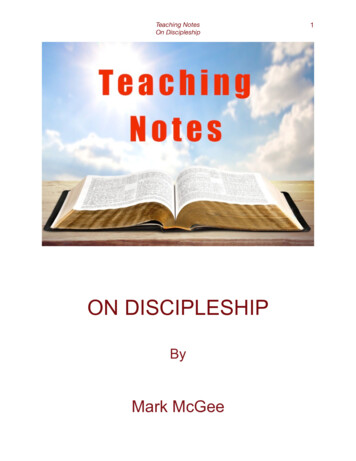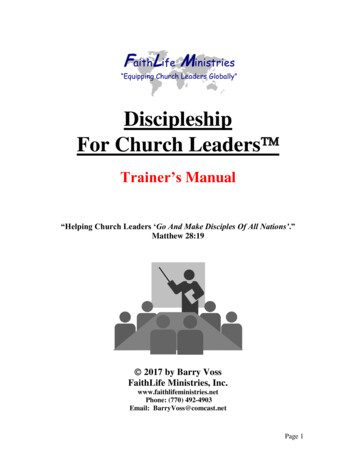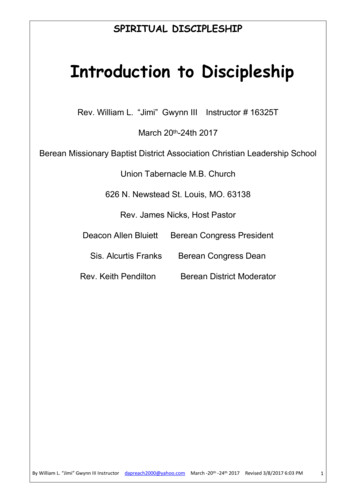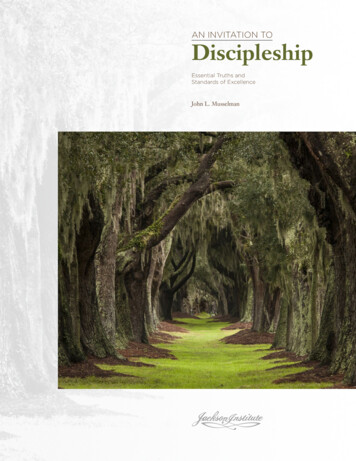
Transcription
AN INVITATION TODiscipleshipEssential Truths andStandards of ExcellenceJohn L. Musselman
AN INVITATION TODiscipleshipEssential Truths andStandards of ExcellenceCopyright 1998 by John L. MusselmanRevised 2002, 2015All rights reserved.The Jackson Institute authorizes you to download,print, or store copies on an electronic device forpersonal or group studies but prohibits any duplication and distribution for commercial purposes.Requests for further information shouldbe addressed to:The Jackson InstituteP.O. Box 500071 Atlanta, Georgia 31150Phone: 770-518-7994 FAX: 770-518-7667info@tji.orgtji.orggraphic design: MisenheimerCreative.com2
AN INVITATION TODiscipleshipCO N TEN TSIntroduction.4Dallas Willard: We Can Become Like Christ.5Your Invitation.6The Call.7Clarifying The Call.8What is Discipleship?.14The Definition Unfolded.15Rationale for Discipleship.17Rediscovering Discipleship.18The Benefits of Discipleship.19A Plan for Discipleship.21Four-Year Curriculum.22Imagine.23Final Considerations.26Standards of Excellence for Great Discipleship Groups.27Your Decision.283
I N TR ODUCT IONIn 1871, A.B. Bruce, a Scottish pastor and theologian, wrote what many consider to be the bestbook ever written on how Jesus trained the Twelve, shaped their lives, and prepared them to takethe gospel to the ends of the earth. After more than 140 years, The Training of the Twelve has stoodthe test of time and has been instrumental in transforming the lives of thousands of men andwomen whose eyes have been opened to see Jesus as never before, and who are now committedto following him and his plan for reaching the nations of the world with the gospel of grace.In my fourth edition copy of Bruce’s classic, published in 1888, a short phrase of four curious Greekwords stands out against the white background of the page immediately following the title page.In Greek and in translation, these words deliver a soliloquy of unparalleled importance whichreveals the key to Jesus’ ministry in the lives of the twelve Apostles.Dr. Bruce excerpted the phrase from Acts 4:13 in the Greek New Testament: “Now as theyobserved the confidence of Peter and John, and understood that they were uneducated anduntrained men, they were marveling, and began to recognize them as having been with Jesus”(NASV). Translated literally, these words mean “they were with Jesus.” The NIV reads, “Thesemen had been with Jesus.” In one brief phrase, the Scriptures capture the essential means by whichJesus imparted his life and teachings to these men. He was simply with them. The disciples learnedby listening to his words and by studying his life. Jesus had imprinted his life upon these men byspending time with them.Everett F. Harrison, author of A Short Life of Christ, acknowledges the significance of Jesus’ investment in these men when he writes: “At the end of his public ministry, Jesus had nothing tangibleto leave as a monument of his life work. There was no literature, nor was there an institution tomemorialize him. He had chosen instead to invest himself in a small group of men. From themcame eventually the literature and the institution of the church. Looking back from the vantagepoint of the apostolic age, it is not difficult to see that the most important work of Christ priorto his death and resurrection was the selection and training of the men who would represent himin the world in the coming days. Significantly, it was to these men that he devoted himself almostexclusively in the interval between the resurrection and the ascension, and very largely so in themonths prior to his death.”1In Christian discipleship, there is only one model for us to follow. The Gospel records revealthe principles and methods Jesus used to transform these uneducated and untrained men. “So, itshouldn’t surprise us that, since they were with Jesus so long, they would prove to be exceptionallygood and noble men when they came before the world as leaders of a great movement, and werecalled on to carry out their responsibilities.”21Everett F. Harrison, A Short Life of Christ (Grand Rapids: Wm. B. Eerdmans Publishing Company, 1968), p. 136.2A.B. Bruce, The Training of the Twelve, ed. John L. Musselman (Atlanta: The Jackson Institute, 1996), 4:182-184.4
We can become like Christin character and in powerand thus realize our highest idealsof well-being and well-doing.That is the heart of theNew Testament message.Do you believe this is possible?My central claim is thatwe can become like Christby doing one thing –by following himin the overall style of lifehe chose for himself.If we have faith in Christ,we must believethat he knew how to live.We can, through faith and grace,become like Christby practicing the types of activitieshe engaged in,by arranging our whole livesaround the activitieshe himself practicedin order to remain constantly at homein the fellowship of his Father.Dallas Willard, PhDLate Professor, School of PhilosophyUniversity of Southern CaliforniaThe Spirit of the Disciplines5
YO UR INVITAT IONInvitation to Discipleship is designed for anyone interested in becoming a more devoted followerof Jesus Christ. It is an invitation for you to become the man or woman God has called you to be.You are being asked to become a part of a discipleship group in order that you might learn howto “become like Christ in character and in power,”3 that is, a more mature follower of Christ.The Scriptures tell us that God is looking for those “whose hearts are fully committed to him,”4who “seek first his kingdom and his righteousness.”5True Christian discipleship always involves life transformation. Christ invested 3½ years withtwelve men, imparted his life to them, and made them like him. In this relatively brief association,these untrained and uneducated men were refined in character, behavior, and speech. Inwardly,their minds and hearts were shaped to fuel new attitudes, motives, and desires. They were nolonger what they had been. From their earliest days in Galilee to the descent of the Spirit atPentecost, their lives were radically altered by Jesus. Likewise, your invitation to discipleshipis an invitation to life transformation in Jesus Christ.After Jesus ascended into heaven, the Twelve spread the message of his love and atoning sacrificethroughout the known world, obedient to their Master’s command to “make disciples of all thenations.”6 Whether they labored in prison or as free men, in the midst of wealth or poverty, intimes of persecution or peace, these men faithfully presented the life-changing message of thegospel to all who would listen, including the hungry, dying, demon possessed, widows, orphans,hopeless, and imprisoned. The long string of mature, reproducing believers they left behindreveals the effectiveness of Jesus’ training and their faithfulness to his strategy for worldconquest. Your invitation to discipleship, then, is also an invitation to learn how to “gossip thegospel”7 with those who do not have a personal relationship with Jesus Christ and to help thembecome mature followers of Christ.Key biblical concepts about discipleship are presented here that will help you make an informeddecision about your involvement. Please begin by reading The Call on the following page, a poemthat presents a vision for Christian discipleship while addressing the inner struggles and practicalrealities that every thoughtful person encounters when considering the call of Christ to follow him.3Dallas Willard4II Chronicles 16:9.5Matthew 6:33.6Matthew 28:18-20.7This phrase was used by Dr. J.I. Packer in an address at Oxford University during the international centennialcelebration of C.S. Lewis’ birth in July, 1998.6
THE CALLWithin these walls of pen and ink, there lies an unseen door,An entrance to a richer life, full heart as ne’r before.A splendid garden of virtue and grace, character refined,Abloom with deeds both pure and light, remaining in the vine.Full trained and ready for the fight, my all I yield to Thee,Obedient to my Master’s call, “Come and follow me.”Leave behind my familiar room, comfortably at ease,Where programs live and studies rule, and classes never cease?My teacher knows the truth, you see, and leads us all to gain,No expectation e’er showered on me, the gospel without pain.Should not I give my soul in praise each and every week,And live content with all I know, without the lost to seek?I think should I approach the door, a turn my life would take,For I would learn my Master’s ways, and from my sloth I’d wake.First learn how Pilgrim8 made his way, as Bunyan saw his dream,An allegory fit for praise, a work of art it seems.Then sit at Bruce’s9 feet a spell, a prof of old who knewThe life of Jesus with the Twelve, and how he trained a few.Four years evokes a cry within, “Too long and much too hard!”Yet do I not admire the oak, strong ringed within my yard?Nature knows how power and strength, produced within the limbs,Ne’r comes in one year’s growing, nor by magician whims.How then, we say, can life be shaped within a month or two,And filled with every needful thing, the Master’s job to do?Commit I to the task at hand, prepare myself to reach God’s world,No looking back, no cost too great, trade in my all for one great Pearl.Shun fear and failure, the Liar’s voice;‘Tis true I have no other choice.The Father moved with mercy, see, sent man his only Son;And loved me so that I might serve, and hear the words, “Well done.”- John L. Musselman8The main character in Pilgrim’s Progress by John Bunyan.9A.B. Bruce, author of The Training of the Twelve.7
C L A RI FYING THE CALLFirst StanzaWithin these walls of pen and ink, there lies an unseen door,An entrance to a richer life, full heart as ne’r before.A splendid garden of virtue and grace, character refined,Abloom with deeds both pure and light, remaining in the vine.Full trained and ready for the fight, my all I yield to Thee,Obedient to my Master’s call, “Come and follow me.”The opening stanza raises a crucial question which every believer should ask: “Is there a doorwayto a richer life in Christ?” For too many, the promises of the gospel are never appropriated andexperienced by faith. The poem’s claim is that on the other side of this “unseen door” there is a“splendid garden of virtue and grace,” a proper environment where one’s character may be shapedand refined by the gospel, where one may truly “be filled up to all the fullness of God.”10Character is not the only target for transformation, however. This lush garden is also “abloomwith deeds both pure and light.” One of the joys of walking through a botanical garden in springis being able to see the beauty of the new flowers that have just emerged from the hidden bulbsplanted beneath the soil. Exploding with color, they offer a genuine feast to those who visit.Similarly, good works flow from one’s character, from an enlightened and softened heart that isliving under the daily influence of the Holy Spirit. James says it this way: “Faith, if it has no works,is dead, being by itself.”11 So, the seed of the gospel planted in a prepared and receptive heart willalways spring forth into godly deeds when the believer is set on “remaining in the vine.”12 “Apartfrom me,” Jesus said, “you can do nothing.”13Furthermore every man, every woman should be “full trained and ready for the fight,” thoroughlyequipped for ministry and spiritual warfare. Inadequate preparation in any field of endeavor canlead to regrettable consequences, including ineffectiveness or, worse yet, defeat. On the other hand,walking through this “unseen door” can lead a believer to excellent training and preparedness fora life of fruitful service in God’s kingdom. A necessary part of this training includes helping thebeliever learn how to surrender his mind, heart, and will in obedience to Christ who beckons,“Come and follow me.”10“And I pray that you, being rooted and established in love, may have power, together with all the saints, to grasp howwide and long and high and deep is the love of Christ, and to know this love that surpasses knowledge – that you may befilled to the measure of all the fullness of God” (Eph. 3:17b-19, emphasis added).11James 2:17.12See John 15.13John 15:5.8
The first stanza, then, offers one14 of the means by which a person may be prepared to glorify Godwith his life, the garden representing a discipleship group. Here, every participant is given theopportunity to grow to maturity in Christ in an environment of love, trust, and mutual support.Second StanzaLeave behind my familiar room, comfortably at ease,Where programs live and studies rule, and classes never cease?My teacher knows the truth, you see, and leads us all to gain,No expectation e’er showered on me, the gospel without pain.Should not I give my soul in praise each and every week,And live content with all I know, without the lost to seek?“Leave behind my familiar room?” The reference is to the prevalent way the church seeks to helpbelievers grow in Christ and prepare them for kingdom service, namely, through its programs.The word program is primarily used in two ways in our culture today. First, it refers to “a listingof the order of events and other pertinent information for a public presentation.”15 Exampleswould be church bulletins setting forth an order for worship and playbills distributed at theaters.This meaning, of course, is not the focus of our concern.A second definition of the word program is “the presentation itself.” This succinct meaningcaptures the primary method by which the church is still seeking to influence and train itsmembers. Year after year, various kinds of presentations are made in multiple environmentsto teach or influence the targeted groups. But is this the way Jesus sought to win the world?In 1963, Dr. Robert Coleman published his book, The Master Plan of Evangelism, which has beentranslated into over a hundred languages and touched the lives of millions. In it, Coleman, formerProfessor of Evangelism at Trinity Evangelical Divinity School and Director of the Institute ofEvangelism at the Billy Graham Center in Wheaton, Illinois, maintains Jesus used another strategyfor winning the world:His (Jesus’) concern was not with programs (emphasis added) to reach the multitudes,but with men whom the multitudes would follow. Remarkable as it may seem, Jesus startedto gather these men before he ever organized an evangelistic campaign or even preached asermon in public. Men were to be his method of winning the world to God.16If Coleman’s words are true, then why is it that so many continue to resort to programs to makedisciples? Why do so many operate out of the conviction that people change as they process andabsorb the information that is presented to them, that individuals make significant, even radical,shifts in their speech and behavior when they discover truth? Again, Robert Coleman goes to thecore of the issue and maintains we have not comprehended Jesus’ ways:14Believers are also prepared to love and serve God as they obediently respond to biblical preaching, partake of thesacraments, foster a rich devotional life, and prayerfully study God’s Word.15The American Heritage Dictionary, 3rd ed., version 3.6p (Softkey International Inc., 1994).16Robert E. Coleman, The Master Plan of Evangelism (Old Tappan, New Jersey: Fleming H. Revell Company, 1963), p. 21.9
Most of the evangelistic efforts of the church begin with the multitudes under the assumption that the church is qualified to conserve what good is done. The result is our spectacularemphasis upon numbers of converts, candidates for baptism, and more members for thechurch, with little or no genuine concern manifested toward the establishment of these soulsin the love and power of God, let alone the preservation and continuation of the work.17It is time that the church realistically face the situation. Our days of trifling are runningout. The evangelistic program of the Church has bogged down on nearly every front.18The individual in the poem is struggling to leave behind this “familiar room,” because he is“comfortably at ease.” And why is he at ease? “No expectation e’er showered on me.” He canparticipate in programs, classes, and worship services without having to do anything. He hasbecome content with what he knows, has not established any personal goals for spiritual growth,and is not involved in kingdom service. His inactivity is a chilling reminder that it is easy toremain in an environment where little or no demands are made, to have the “gospel without pain.”In 1966, before the collapse of Communism, Douglas Hyde, a leader of the Party in Great Britainfor 30 years, wrote a book entitled Dedication and Leadership, contrasting the Communist’s causewith Christianity.They (the Communists) say that if you make mean (low or inferior) little demands uponpeople, you will get a mean little response which is all you deserve, but, if you make bigdemands on them, you will get an heroic response.They work on the assumption that ifyou call for big sacrifices people will respond to this and, moreover, the relatively smallersacrifices will come quite naturally.Like attracts like. Those who are attracted by the dedication they see within the movementwill themselves be possessed of a latent idealism, a capacity for dedication. Thus dedicationperpetuates itself. It sets the tone and pace of the movement as a whole. If the majority ofmembers of an organization are half-hearted and largely inactive, then it is not surprisingif others who join it soon conform to the general pattern. If the organization makesrelatively few demands upon its members and if they quite obviously feel under noobligation to give a very great deal to it, then those who join may be forgiven forsupposing that this is the norm and that this is what membership entails.19In the light of this analysis, why has the church not given up on programs? Is it because they areso effective in making disciples? Could it be that many believers have simply become attached toreligious activity that has very little to do with the demands of the gospel? Pascal was right:“How tiresome it is to give up pursuits to which we have become attached.”20 Programs may bean effective way to keep people involved in the life of the church, but an ineffective way of makingreproducing disciples. The mission of the church is not to take attendance, but to lead people toChrist, to help them become more godly, and to equip them to obey everything Jesus commanded.17Ibid., p. 33.18Ibid., p. 35.19Douglas Hyde, Dedication and Leadership (Notre Dame: University of Notre Dame Press, 1966), p. 18.20Blaise Pascal, Pensées (Harmondsworth, Middlesex, England: Penguin Classics, 1968), p. 79.10
“Should not I give my soul in praise each and every week?” Yes, everything in our lives flows out ofour corporate and private worship of the triune God. But when we “live content with all I know,”and do nothing to bring the gospel to the lost, we have abandoned Jesus’ last words: “But you shallreceive power when the Holy Spirit has come upon you; and you shall be My witnesses both inJerusalem, and in all Judea and Samaria, and even to the remotest part of the earth.”21Third StanzaI think should I approach the door, a turn my life would take,For I would learn my Master’s ways, and from my sloth I’d wake.First learn how Pilgrim22 made his way, as Bunyan saw his dream,An allegory fit for praise, a work of art it seems.Then sit at Bruce’s23 feet a spell, a prof of old who knewThe life of Jesus with the Twelve, and how he trained a few.“I think should I approach the door” expresses the hesitancy with which many move towarddiscipleship. Holding to vague notions about what the experience would be like, most believe theirlives would be enriched and changed by having a personal mentor and other friends who could helpthem on their spiritual journey (“a turn my life would take”).“My Master’s ways” refers to the ways of Christ. The prophet Isaiah told the people of Jerusalemand Judah: “He will teach us his ways, so that we may walk in his paths.”24 How exhilarating tofollow the Lord Jesus Christ! To follow him is to be fully alive (“from my sloth I’d wake”) withhope and faithful expectation.The two books discussed in this stanza are Pilgrim’s Progress by John Bunyan and The Training ofthe Twelve by A.B. Bruce, classic works from the 17th and 19th centuries, respectively, that havebeen used by God to transform countless lives around the world.Fourth StanzaFour years evokes a cry within, “Too long and much too hard!”Yet do I not admire the oak, strong ringed within my yard?Nature knows how power and strength, produced within the limbs,Ne’r comes in one year’s growing, nor by magician whims.How then, we say, can life be shaped within a month or two,And filled with every needful thing, the Master’s job to do?As with all worthwhile pursuits, discipleship takes time. The time required is always proportionalto the desired outcomes. Becoming a journeyman electrician requires one set of standards, whilebecoming the commander of a nuclear submarine demands another. Jesus chose to spend approximately 3½ years with the Twelve so he could finish the work that he began with them. It must havetaken that long for Jesus to train them.2521Acts 1:8.22The main character in Pilgrim’s Progress by John Bunyan.23A.B. Bruce, author of The Training of the Twelve.24Isaiah 2:3.25John 17:4.11
“Four years evokes a cry within” is a response of resistance. “Why so long?” one asks. Yet the poemargues that everyone understands that an oak tree takes years to grow into a pillar of strength andshade. Why, then, is it not obvious that a life cannot be “shaped within a month or two”?Fifth StanzaCommit I to the task at hand, prepare myself to reach God’s world,No looking back, no cost too great, trade in my all for one great Pearl.Shun fear and failure, the Liar’s voice;‘Tis true I have no other choice.The Father moved with mercy, see, sent man his only Son;And loved me so that I might serve, and hear the words, “Well done.”The final stanza reveals the submissive heart of the one responding to the call of God. “CommitI to the task at hand” is a deliberate and conscious decision to enter into the discipling process inorder to “grow in the grace and knowledge of our Lord and Savior Jesus Christ”26 and to “preparemyself to reach God’s world.” Two of Satan’s most effective weapons against believers are fear andfailure, both intended to paralyze and hinder kingdom service. Christians must “put on the fullarmor of God”27 and silence the Liar’s voice, looking unto a merciful heavenly Father for grace andstrength to remain faithful in the battle. And finally, as the poem concludes, we are reminded thatthere is “no cost too great” in order to gain the one great Pearl and his divine “Well done.”Concluding ThoughtsWhen God reached down in his mercy and gave you the free gift of eternal life through his Son,Jesus Christ, he not only forgave your sins and adopted you into his family, but also gave you acharge to be involved in reaching others who do not know him. For many, this is a frighteningchallenge, giving rise to deep feelings of inadequacy and unworthiness. But are these fearswithout foundation?Suppose you were invited to the airport one morning and told you could take a single-engine planeup for a spin by yourself but had never been trained as a pilot. You would immediately decline theoffer, that is, if you valued your life. On the other hand, imagine that an invitation was extended foryou to receive professional training by which you could safely fly that plane one day. If you had aninherent interest in flying, the offer would sound extremely attractive.Similarly, if you had never received any training or equipping to do what Jesus asked you to do,wouldn’t it be appropriate to experience feelings of inadequacy and fear? Remember, Jesus spentover three years with the Apostles preparing them to carry the gospel to the ends of the earth.Not one of them would have been able to carry out his commands without this personal andthorough training.When Jesus had completed his training of the Twelve, he gave them what has become known asthe Great Commission. These 50 words28 expose his heart and highlight his highest priority forreaching a lost world with the gospel.26II Peter 3:18.27Ephesians 6:10-20.28In the original Greek language.12
All authority in heaven and on earth has been given to me. Therefore go and make disciplesof all nations, baptizing them in the name of the Father and of the Son and of the HolySpirit, and teaching them to obey everything I have commanded you. And surely I will bewith you always, to the very end of the age.29Commenting on this passage, A.B. Bruce, the Scottish scholar, pastor, and author, shakes us fromour numb familiarity with Jesus’ words by saying,Surely this is the language of a Divine Being. What mere man ever conceived of such a planthat would include the whole human race in its scope? Who except One who possessed all powerin heaven and on earth could dare to hope for success in such a gigantic undertaking?30With straightforward candor, Dr. Bruce further exhorts all believers to consider what Jesus reallyexpects from us if we would follow him. With integrity of heart, without distraction, withoutmurmuring, envy, or weighing consequences,He wants his children to think of all of his orders as wise, all his arrangements good,acknowledging his right to lead as he pleases, content to serve him in a little place orin a big one, by doing or by suffering, for a long period or a short one, in life or bydeath, if only he be glorified.31Carefully consider what he is saying:v Jesus wants you to think that everything he commands is totally wise.v He wants you to believe that everything he does is perfectly good.v He wants you to acknowledge that he has an absolute right to lead you just as he pleases.v He wants you to be content, whether you are serving him in a small village or in a large city.v He wants you to serve him, even if it involves some form of suffering.v He may want you to serve him for many years, but you might have only days or hours to live.v He may require you to serve him by giving your life for him.v He never wants you to lose your integrity.v He does not want you to be distracted by the things in this world, complain about anything,or long for more than what you have.v He does not want you to be concerned about what serving him might cost you.v He only wants you to be concerned about glorifying him.The Call, then, is an invitation for you to come and follow Jesus. It is a summons to “trade in yourall for one great Pearl”32 and to “prepare yourself to reach God’s world.” It is a call for you tobecome the man or woman God intended for you to be.You are not going to be asked to fly the plane on your first trip to the airport. This invitation is forground school where you will be trained and equipped to live a life that is pleasing to the Lord.During the time of your discipleship, you will be challenged to examine every area of your life inthe light of the Scriptures so that you may emerge as a man or woman after God’s own heart.3329Matthew 28:18-20.30A.B. Bruce, The Training of the Twelve, ed. by John L. Musselman (Atlanta: The Jackson Institute, 1996), 4:171.31A.B. Bruce, The Training of the Twelve, ed. by John L. Musselman (Atlanta: The Jackson Institute, 1996), 4:163.32Matthew 13:45-46.33“I have found David the son of Jesse, a man after My heart, who will do all My will” (Acts 13:22).13
WHAT I S DISCIPLESHIP?Words may emerge over time with so many connotations that the explicit, original meaning, ordenotation, becomes obscure. The word discipleship is one of those words. Some use it to describewhat takes place in what Robert Coleman calls “vague institutional programs.” These are usuallychurch established programs initiated for the sole purpose of “getting people involved in the life ofthe church” and maintained with little or no expectation of lasting transformation. Others restrictthe word with unnecessary limitations, forcing the idea that discipleship implies a meeting betweentwo, and only two, people, e.g., one mentor and one pupil (called one-on-one discipleship).Furthermore, there are those who promote the notion that the core meaning of the wordhas to do with the content, or curriculum, studied by the learner or disciple.As we turn to the Scriptures, however, we
Invitation to Discipleship is designed for anyone interested in becoming a more devoted follower of Jesus Christ. It is an invitation for you to become the man or woman God has called you to be. You are being asked to become a part of a disc
